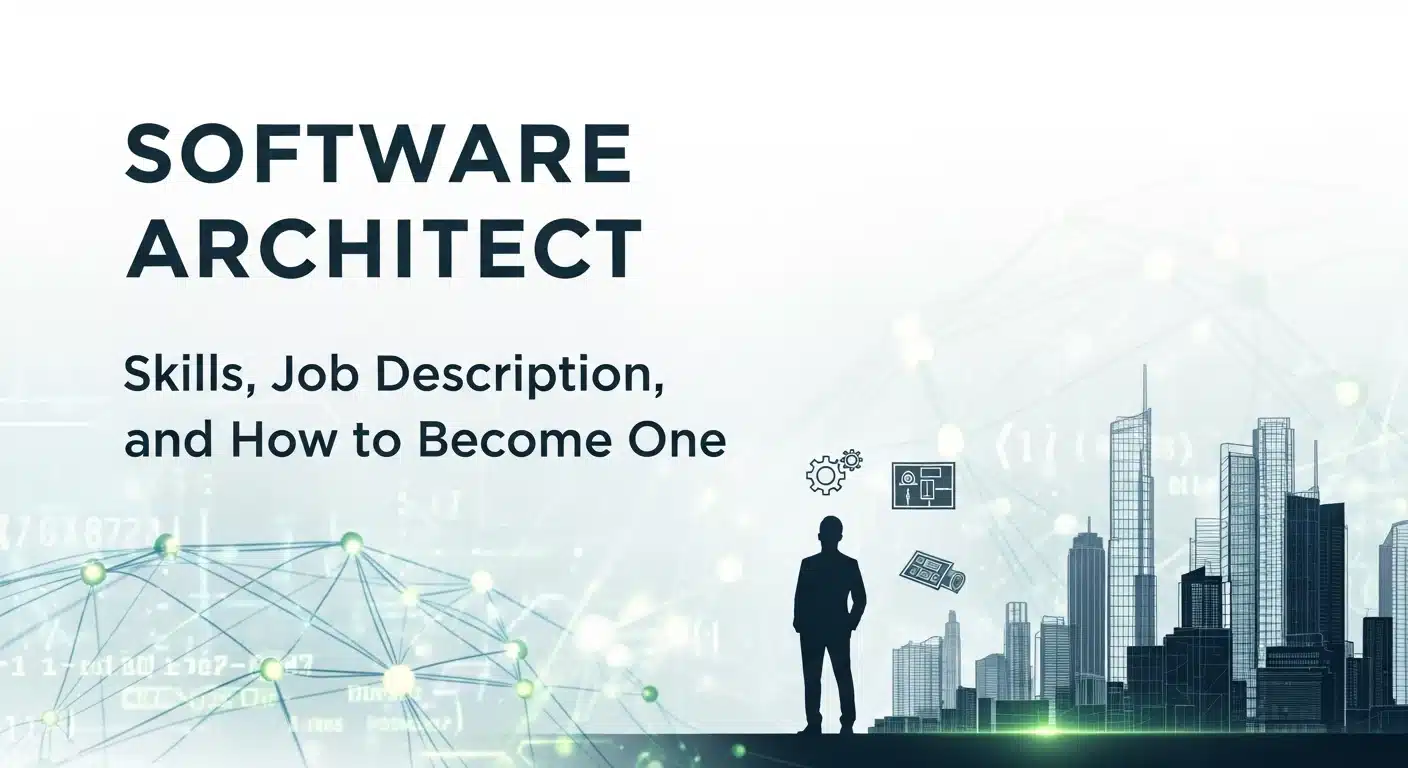- Who is a Software Architect?
- Responsibilities of a Software Architect
- Common Industries and Environments
- Key Skills Required for Software Architects
- Courses to Get These Skills
- Gaining Practical Experience in Software Architecture in 5 Steps
- Educational & Learning Path for Software Architecture
- Online Courses & Bootcamps:
- Self-study and Practice:
- FAQs
Who is a Software Architect?
Software Architects develop the plan of software systems, balancing both technical and business requirements, and come up with systems that are scalable, maintainable, & efficient. They assess architectural trade-offs, work with developers, product managers, & business leaders to align with strategic goals.
Global Average Salary (2025):
Glassdoor reported an average yearly salary of a Software Architect to be USD 116,067 worldwide.
India Average Salary (2025):
A Software Architect in India earns an average of 2,920,391 (somewhere around 29.2 lakhs) every year.
Responsibilities of a Software Architect
- Designing Software Architecture:
- Choose an architectural design, including microservices, monolithic, or serverless, depending on the needs of the project, and develop the software systems to satisfy the functional needs of the business.
- Technology Selection:
- Assess and determine the technologies that can meet the objectives of the business, in terms of aspects such as scalability, maintainability, and cost-effectiveness.
- Guiding Development Teams:
- Lead development teams in executing architectural decisions, offer support and guidance throughout the development process to make certain that developers are using best practices in coding and design.
- Creating Documentation:
- Create comprehensive design documents that describe the architecture of the system, data models, class diagrams, & user flow diagrams.
- Risk Management:
- Identify potential risks associated with the architecture, such as performance bottlenecks or security gaps, & propose solutions to mitigate them.
- Quality Assurance:
- Make sure the software system meets quality requirements, conduct testing, code review, & performance analysis.
- Continuous Improvement:
- Monitor software system performance in production & suggest improvements based on user feedback & system performance information.
Common Industries and Environments
Software architecture plays a crucial role across various industries. Some of the key areas where Software Architects are in demand include:
- Technology & Software:
Design & support the architecture of large-scale enterprise applications, cloud services, & mobile applications.
- Finance & Fintech:
Develop safe, scalable online banking, trading, & payment processing systems.
- E-commerce & Retail:
Establish well-developed systems to support e-commerce platforms, including inventory & payment gateways, as well as transaction processing.
- Healthcare & MedTech:
Develop safe and easy-to-use systems for handling patient information, medical records, & appointment schedules.
- Government & Public Sector:
Design secure, scalable, & accessible architecture systems & e-governance solutions for public services & government platforms.
Key Skills Required for Software Architects
Technical Skills:
- System Design:
Knowledge of the design of complex software systems, both in the architectural pattern and the data models.
- Programming Languages:
Detailed experience in programming languages such as Java, Python, or JavaScript, and knowledge of how these languages work in large systems.
- Cloud Computing:
Knowledge and experience of scalability of distributed systems by using cloud platforms such as AWS, Azure, or Google Cloud.
- Database Design & Management:
Knowledge of database design architecture & the ability to design systems that process high volumes of data.
- Security Best Practices:
Skill in building secure systems, encryption, & adherence to the standards of security to defend user data.
- Performance Optimization:
Capability to optimise software systems through the ability to make decisions that minimise latency & maximise scalability.
- DevOps & CI/CD:
The familiarity with the DevOps principles, continuous integration, & deployment pipelines facilitates the process of development & delivery.
Soft Skills:
- Leadership & Mentoring:
Ability to lead development teams, mentor junior developers, & provide concrete guidance to ensure projects are completed successfully. - Problem-Solving:
Critical thinking skills to assess complex concerns and design innovative resolutions that balance performance without compromising security and cost. - Communication:
Clear communication skills to communicate technical concepts to non-technical stakeholders and collaborate effectively with cross-functional teams. - Collaboration & Teamwork:
Ability to work closely with other architects, developers, and stakeholders to design and implement solutions that meet business needs.
Courses to Get These Skills
- Master Java Programming:
An upscale course that explores further into Java programming, including OOP concepts, multithreading, and JavaFX, based on the development of complex applications, including games. - Master Python Programming:
An advanced Python course to become fluent and learn the advanced topics and solutions used in Python and in general backend development of games, and managing data. - Java Projects:
You will be engaged in practical projects that will strengthen your programming and problem-solving skills in the environment of an actual Java application through a hands-on course in which you will work on practical Java projects, including applications in the real world. - Java Applications:
Learn the construction of full-fledged Java applications, with attention to the construction of user interfaces, connectivity of databases, and software development. - Introduction to JavaScript:
An easy-to-understand course on learning JavaScript basics, the building blocks of games and interactive web functionality, such as variables, functions, and loops.
- AWS for Beginners:
A beginner course created to help you learn about and work on products based on Amazon Web Services (AWS) and learn how to use cloud technologies to create scalable game applications. - AWS Project:
Acquire insights into the deployment, as well as the construction of cloud-based infrastructure on the basis of using AWS, to develop a game or any other software application. - Introduction to DevOps:
Learn the tenets of DevOps (such as continuous integration, practices of continuous delivery, and deployment), contributing to a streamlined process of solution development.
Gaining Practical Experience in Software Architecture in 5 Steps
- Start with Software Development:
Start out as a software developer to gain experience in coding, problem-solving, and how large systems are constructed. - Get Involved in Architecture Design:
Once you become experienced, you can begin to take on the responsibilities of system architecture even though you still have a development role. - Mentorship:
Ask highly experienced software architects to mentor you in architectural decisions and good practices. - Work on Complex Projects:
Do more demanding projects where you can build systems with increased complexity and scale, and hone your architectural capabilities. - Contribute to Open-Source Projects:
Contribution to open-source software projects, whereby you can work with other seasoned developers and architects.
Educational & Learning Path for Software Architecture
- Bachelor’s Degree:
Begin by earning a bachelor's degree in either computer science or software engineering, or a similar subject, which will equip one with the basic material of programming and systems architecture. - Master’s Degree (Optional):
Advanced knowledge and Specialization in architecture can be offered by a Master's in software engineering or Computer science. - Lifelong Learning:
To remain competitive, it is highly recommended to stay up-to-date with the latest tools, frameworks, & best practices through certifications as well as courses.
Online Courses & Bootcamps:
Free Courses:
- Microsoft Azure Essentials
The course presents an introductory, beginner-friendly self-paced course to Azure services, covering virtual machines, storage, and resource management with free lifetime access. - Software Testing Fundamentals:
Get familiar with the fundamentals of software testing (particularly development of successful test plans and strategies critical to passing bug tests). - Software Development Life Cycle Fundamentals (SDLC):
Get familiar with the software development life cycle, including planning, development, testing, and deployment, and understand how SDLC can be applied to a game development project.
PG and other Courses
- PG Program in Cloud Computing:
An advanced course that is tailored to develop an advanced understanding of cloud computing, ideal for providing the knowledge needed to develop scalable cloud-based game architectures for game programmers.
Self-study and Practice:
Practice with Real-World Challenges:
Work on software architecture projects such as designing a scalable e-commerce platform or a cloud-based messaging system. Participating in open-source projects on GitHub can also give hands-on experience in creating architectures for real-world applications.
Tools to Master:
Master tools like UML, Lucidchart, Visio, and Archimate for creating practical system diagrams, and use AWS CloudFormation and Azure Resource Manager for managing cloud infrastructure.
Create Personal Projects:
Develop software architecture projects, e.g., a customer management system or even an IoT platform. These individual projects will assist in supporting early learning and developing a portfolio that demonstrates the possibility of creating scalable and maintainable systems.
Further Resources to Aid Your Journey
Blogs & Articles:
- How to Become Software Engineer
- What is Vibe Coding?
- Everything You Need To Know About Cloud Architecture
- Features of Java
- AWS vs Azure
- Career Options after Computer Engineering
Online Communities:
Relevant Tools & Platforms:
FAQs
Q1. What is the difference between Software Screamer and Software Schemer?
Software Architects are concerned with the overall design of the system, principal architectural decisions, and scalability and maintainability. Conversely, the Implementation of the designs is being conducted by the Software Developers who are concerned with the developmental aspects of individual components.
Q2. Does it require a degree to be a Software Architect?
Although a computer science or software engineering degree will be an advantage, it is not a hard necessity. Software development experience, creation of a good portfolio, and the attainment of the applicable certifications can assist you in transitioning into architecture roles.
Q3. What are the requisite skills to be a Software Architect?
An effective software architect needs to be an excellent system designer, skilled in software development, cloud familiarity, familiar with or a user of architectural frameworks (TOGAF), and to possess knowledge of software concepts of security and scalability.
Q4. What can I do to develop a powerful Software Architecture portfolio?
Your portfolio must include case studies of real-world software architecture you have created, your process of decision making, and architectural patterns with which you created the solution, and how the solution meets the business and technical requirements.






